We first saw the Vacheron Constantin Overseas Ultra-Thin at the SIHH last January, and at the time, our impressions based on the brief exposure afforded by a meeting in the middle of a busy trade show were limited to "seems nice, pretty expensive, too bad it's not in steel." To a certain extent those are still the impressions I have of the watch, but after a week of wearing it, they've become (I hope) more nuanced. Let's look at what it's like to live with one of the most austere (and pricey) time-only watches in the world.

The Vacheron Constantin Overseas Ultra-Thin is indeed a very flat watch, with a case thickness of 7.5mm (and a diameter of 40mm). The movement is the Vacheron caliber 1120, which, as we mentioned in our earlier introductory coverage of this watch at the SIHH, started life in 1967 as the result of a collaborative movement development program which involved Jaeger-LeCoultre, Audemars Piguet, Vacheron Constantin, and Patek Philippe; AP, VC and Patek all used the movement under different caliber designations, with Jaeger-LeCoultre producing it as the JLC caliber 920, although JLC has never actually used the movement in their own watches. The movement was at the time of its launch in 1967 the thinnest full rotor self-winding movement in the world, and rather amazingly, it remains the holder of that record today, 49 years later. Naturally, it's mostly been used in watches notable for their slim profiles. The thinnest watch from Vacheron using this movement isn't the Overseas Ultra-Thin, but rather, the Historiques Ultra-Thin 1968, a square-cased wristwatch with a case thickness of 5.4mm, water resistant to 3 bar/30 meters. Audemars Piguet's Jules Audemars Extra Thin, which uses the same movement, is 6.70mm x 41mm; the Royal Oak Extra Thin, which uses the caliber 2121 – the same movement as the VC1120/AP2120, but with the addition of the date – is 8.10mm thick, at 39mm in diameter, with a water resistance of 50m.


The very first watch from Vacheron Constantin to use the caliber 1120 – without date – was the reference 7398, in September of 1967; this was a round, flat (obviously) dress watch, and it was one of three watches launched that year by VC (references 7399, with a cushion case, and reference 7400, another round watch, followed later in the same year).
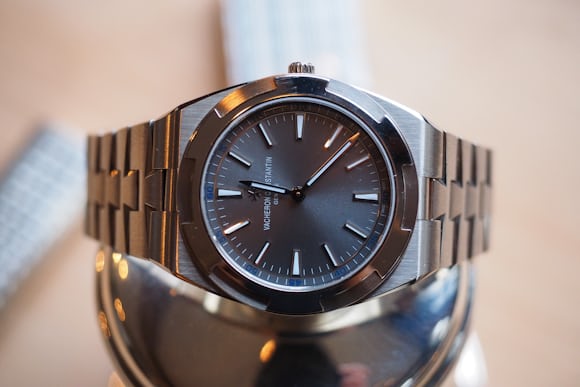

Right at the outset, the Overseas Ultra-Thin is an extremely seductive watch. Unlike many ultra-thin watches, which more often than not come on straps and are extremely light in the hand, as well as virtually unnoticeable on the wrist, the Overseas Ultra-Thin has a palpable heft to it. Given the slender profile, it's not an unpleasant sensation at all; there is just enough weight to the watch, on its bracelet, that you're aware of its presence, and when you combine that with the suppleness and beauty of execution of the bracelet, putting the Overseas Ultra-Thin on for the first time is very much a "wow" experience.

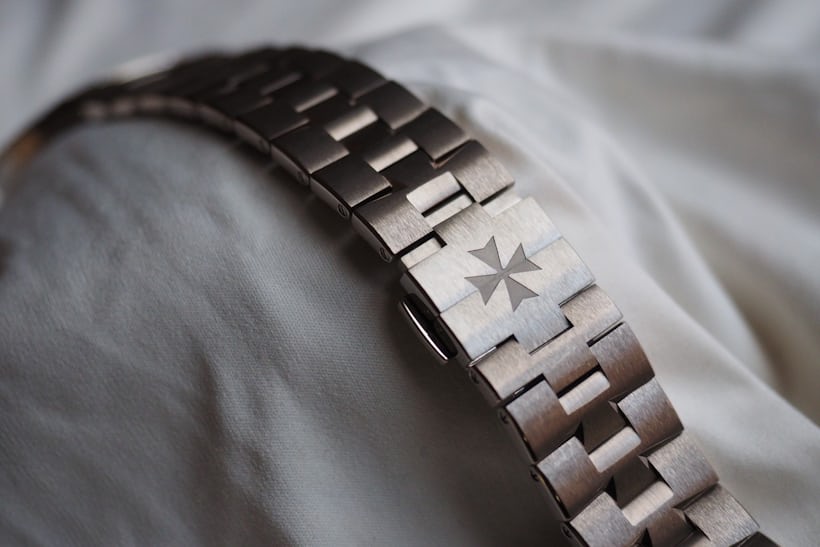
Whether by luck, or design, or some serendipitous combination of the two, Vacheron's managed to create a kinesthetic experience in the watch as a whole that has to be felt to be believed.
The bracelet on the Overseas Ultra-Thin is absolutely phenomenal. The combination of brushed and polished surfaces catch the light in a really mesmerizing way, and the wonderful level of finish on the white gold links and clasp, combined with the mass of the watch, give it a feeling in the hand and on the wrist I really can't recall getting from any other watch bracelet I've ever handled. It's not just the just-right mass or the beautiful metalwork, it's the combination of the two, and the bracelet is so comfortable that it feels almost alive. As much as this might put off those with phobias about snakes, the sensation is very akin to handling one – there's a sense of flexibility and suppleness, sure, but also connectedness, so to speak. It's one thing for a watch to have nothing to which you can object; it's another thing to have it draw you in in what feels like an almost active fashion, and it's almost unnerving – as if it really does have that life-0f-its-own quality that so many of us want in a watch but seldom really get. Whether by luck, or design, or some serendipitous combination of the two, Vacheron's managed to create a kinesthetic experience in the watch as a whole that has to be felt to be believed.

Wearing a watch like this can be, depending on your tastes, very much an exercise in what you might call horological sufficiency. I always wonder, when I'm test-driving a watch, whether or not it could be a watch you'd wear as your daily wear watch. Sometimes the question is dead before it can leave the gate – most specialist complications aren't candidates, for obvious reasons; many sports watches are not, due to size or other design aspects that limit their versatility; many dress watches are obviously too fine to be anything other than, well, dress watches.
The Overseas Ultra-Thin, on the other hand, comes very, very close to being an unequivocal yes in terms of not only being a watch you could wear every day, but also a watch you would want to wear every day. It's fine enough to be suitable for pretty much any occasion I can imagine short of by-the-book white tie (and you might be able to get away with it even then). It's also, interestingly enough, quite robust for an ultra-thin watch, as befits its membership in the Overseas family. It's antimagnetic, to a degree – there's no full soft-iron enclosure but there is a soft iron casing ring, which provides, if not a similar degree of protection as a full inner case and dial, at least some degree of protection (in the same way a full enclosure would: by providing a preferred pathway for magnetic field lines). It's even rated to 5 bar/50 meters water resistance.
Generally speaking, when I'm wearing a watch for A Week On The Wrist I want to have at least a little time away from it; and as a rule, it's nice to take at least a little break from wearing a review piece. (Sometimes it's a big relief; try wearing a watch you don't really care for personally for a whole week. It's like having a houseguest you can't get rid of.) I can honestly say that in the case of the Overseas Ultra-Thin, taking it off was always an occasion for regret and putting it on again after having been away from it, even for a short time, was always a source of that small but distinct pleasure we all always hope to get from any watch. It was a reminder that watches are very intimate things and unlike a lot of jewelry, are often worn on a daily basis – as such, they need to be something you can love on a daily basis, not just tolerate.
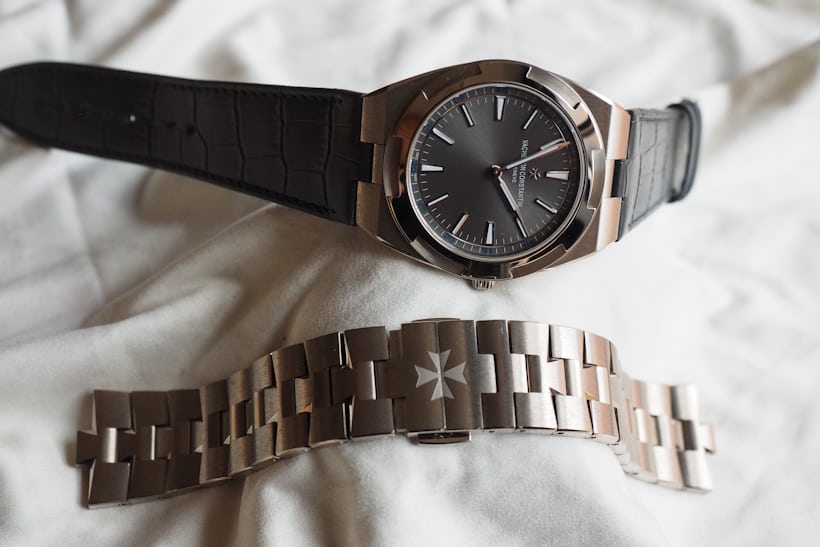
Now of course, one of the most interesting features of the Overseas Ultra-Thin is that you don't get just a bracelet. The Overseas Ultra-Thin uses the new interchangeable strap system that Vacheron has rolled out for its revamped Overseas collection. Such things can seem gimmicky of course, or at least, a little déclassé (we've all seen swap-able straps used to try to sell undistinguished watches) to say nothing of unnerving if you don't feel absolutely sure that the locking system is secure. In this case I'm happy to say the system works extremely well. It's very quick, it's dead simple to use, and happily enough, the watch takes on a very different character depending on what you've chosen to keep it on your wrist. Changing the strap or bracelet is also an opportune time to see just how thin the watch really is – not record breaking, but still, pretty damned flat.



With the white gold bracelet, this is a quiet but definite exercise in luxury, especially if you can easily distinguish the grey pearlescence of white gold from the colder, more forbidding frostiness of polished steel. Put the watch on one of the straps you get with it, though – you have a choice of either rubber or black lined grey aligator – and it becomes something you could wear either to a day at the beach or to a formal event, depending on your mood and circumstances. To change the strap or bracelet, you just push in the little tabs hidden in the end-links of the bracelet or the ends of the strap (where spring bars would normally sit) and you can slide the strap or bracelet off; to attach one, you just snap it into place. In the week I had the watch for review, there were absolutely no issues with security with the system.
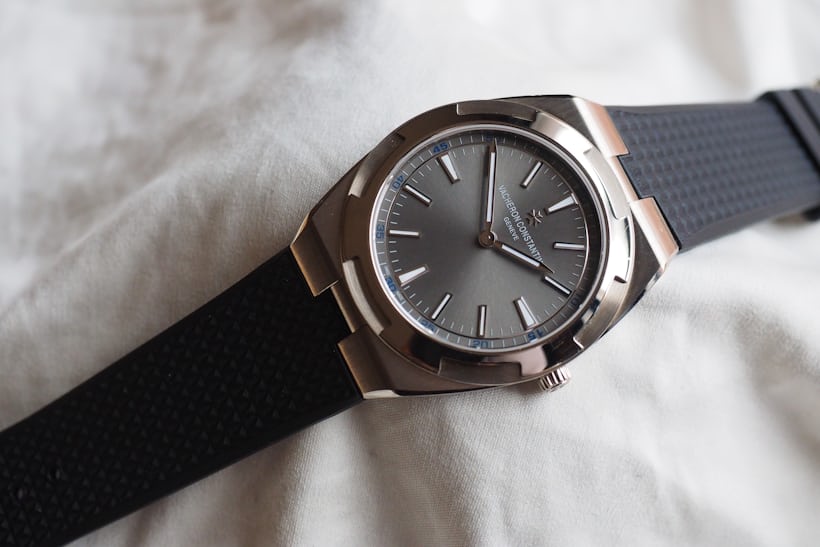
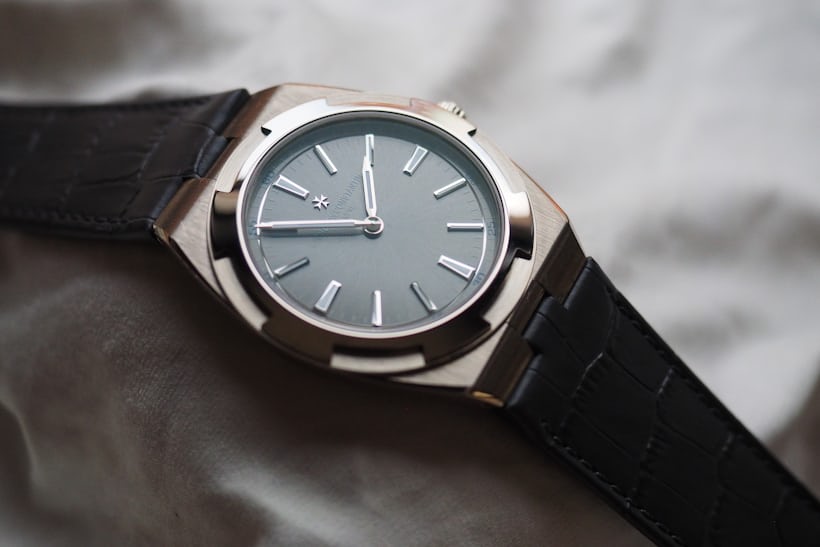
There are all sorts of notions about what makes a watch design successful. Some are contextual of course – a minimally legible diver's watch, or a watch with poorly designed ergonomics that make it hard to operate, are by any reasonable definition of design, designed badly. From both an aesthetics and functionality standpoint, there is always a tendency to fall back on rules of thumb that may or may not yield good results – "less is more" is probably one of the worst culprits, because less is definitely not more except under very specific circumstances. What people really mean – or really should mean, anyway – when they say "less is more" is "every element is flawless in itself, stands in the best possible relationship to every other element, and there's nothing unnecessary to detract from either aesthetics or functionality." That is a very, very hard set of criteria to fulfill, but as reluctant as I am to say it for various reasons – the price of the Overseas Ultra-Thin, for one, and a general resistance to seeming too subjectively involved in a review for another – I'm forced by the overwhelmingly positive reaction I had to the Overseas Ultra-Thin to say that it comes awfully, awfully close.



So is this a perfect watch? Of course it's not; the question has no real meaning, except to function as what philosophers like to call an intuition pump. But it is, if you're susceptible to its particular suite of charms, an almost irresistible watch; and even if you're not, I think it's hard to avoid seeing the degree of design intelligence it represents. There are all sorts of ways this thing could have gone off the rails – the twee and unnecessary resurrection, for instance, of the Maltese cross medallion on the lower right hand corner of the case, from the vintage 222; it would have been cute, sure, but it would have been a mistake – one of those tiny but fatal holes out of which all the rightness of a design can leak. (So would have been a seconds hand, or a date window.) Should this watch have been offered in steel? It would have been a less expensive watch but it also would have been a completely different one; everything from the appearance of the metal to the effect of the finishing methods, to the overall sense of appealing but not overwhelming mass that this watch has in white gold, would be absent in steel. (This is not to say that the Overseas Ultra-Thin would be a bad watch in steel – very likely it wouldn't be – but it's worth pointing out that it would be a very different watch). Is it too expensive? The question is prima facie absurd – of course it's too expensive, too expensive by half, and by any rational measure, you should take one look at the price tag, think of all the other watches you could get for nearly sixty thousand dollars, and say to yourself, "Well, this is Nature's way of saying, 'don't touch.'" (To be fair, however, the AP Jumbo in rose gold, the closest thing I can think of to the VC Overseas Ultra-Thin, with exactly the same movement but for the date guichet, is almost exactly the same price.)
The only problem with that, is that any other watch wouldn't be this watch, and if you want this watch – with its all-too-rare ability to seem both wonderfully simple without being simplistic; with all its design purity; with all its capacity to remind you just how satisfyingly right a few components standing in perfect harmony to each other can be – it's going to cost you, more or less, $55,700 dollars.
It's a little maddening that less costs so much more, but at least in this case you can take more than solace in the fact that less really is more.

The Vacheron Constantin Overseas Ultra-Thin Reference 2000V/120G-B122: case, 40mm x 7.50mm, white gold. Antimagnetic casing ring, water resistance 50 meters. Dial, grey-lacquered, sunburst satin-finished base with velvet-finished minute-track. 18k white gold hands and markers. White gold bracelet, grey alligator or rubber strap. Movement, caliber 1120, 40 hour power reserve, 2.45mm x 28.4mm, 19,800 vph, running in 36 jewels. Geneva Hallmark. Available August-September 2016; price, $55,700. Visit VC online here.
Don't have the HODINKEE App yet? Get years of amazing watch content plus new stories, breaking news, and access to great new features like HODINKEE Live, free on iOS.
No comments:
Post a Comment